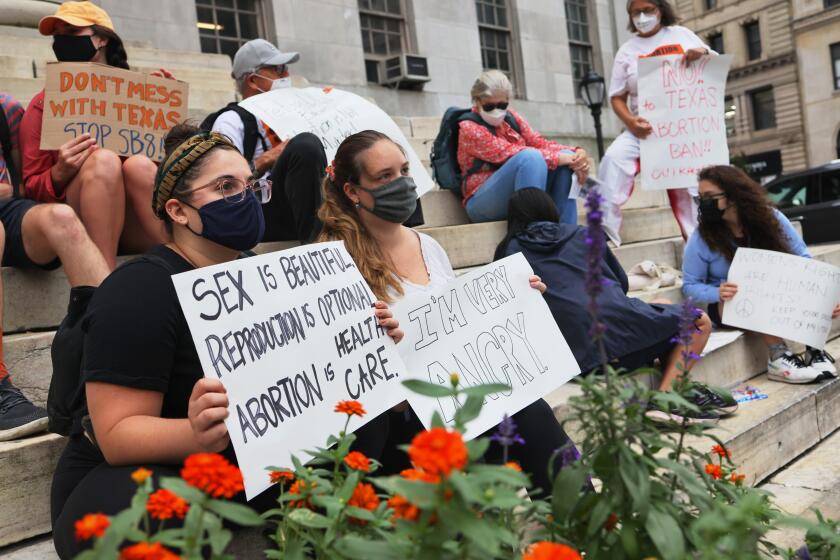News Analysis: Supreme Court signals Roe vs. Wade will fall after allowing Texas to ban most abortions

A deeply divided Supreme Court is allowing a Texas law that bans most abortions to remain in force, for now stripping most women of the right to an abortion in the nation’s second most populous state.
WASHINGTON — The Supreme Court’s conservative majority has sent its strongest signal to date that Roe vs. Wade will fall, having given a green light to the nation’s second-most populous state to outlaw abortions after six weeks of pregnancy.
The justices did not overturn the right to abortion in the order they released at 11:58 p.m. Eastern time Wednesday on the Texas case, and they might not formally overrule Roe vs. Wade later this year when they take up a case from Mississippi.
But the five most conservative justices made it clear they would not protect women or their doctors if they face abortion-related penalties imposed by a state.
What the Supreme Court ruling on the Texas abortion ban means for politics
For the first time, President Trump’s three appointees joined together to rule in an abortion dispute, aligning with Justices Clarence Thomas and Samuel A. Alito Jr., who have opposed abortion rights in court opinions for more than 30 years. The justices rejected an appeal from physicians in Texas and left in place a law that says it is illegal for a doctor to perform an abortion if a fetal heartbeat can be detected.
Florida State University law professor Mary Ziegler, an expert on the history of abortion law, said the decision pointed to the demise of Roe.
“I think that any court that took the right to abortion seriously would have stayed this law,” she said. “I think the real question is how and when the court overrules Roe. It may not be in Dobbs [the case from Mississippi], but the end of Roe seems inevitable.”
“The only way to understand the court’s action,” said Erwin Chemerinsky, dean of the UC Berkeley School of Law, “is that there are five votes to overrule Roe vs. Wade.
“Given their desire to do so and their opposition to abortion rights,” he said, “they could not bring themselves to block the Texas law. The law bans, effectively, abortions after the sixth week of pregnancy. That obviously cannot be reconciled with Roe.”
The Texas Legislature was given credit for cleverness, however, even by its critics. Rather than simply pass an abortion ban to be enforced by the state, the legislators adopted a measure that makes even early abortions illegal but turns over the enforcement to any resident who wants to sue a doctor or the clinic staff. They are promised at least $10,000 in damages from the state courts, as well as coverage of their legal costs, if they show there’s been a violation of the new law.
In turning away the appeal, the majority said that it “presents complex and novel antecedent procedural questions” because it is not clear in advance who might sue to enforce the law.
But it is hard to imagine the court’s conservatives would stand aside if, for example, California said it was illegal for churches to hold indoor worship services during the COVID-19 pandemic and the Legislature authorized Californians to bring $5,000 damage suits against pastors or church officials for convening such services. In February, the court granted an emergency appeal to block California’s restrictions on indoor worship services on the grounds the limits violated the 1st Amendment and its protection for the free exercise of religion.
If the Texas approach is upheld, Chemerinsky said, states could authorize private lawsuits to undermine any right they opposed.
“If the Texas Legislature wants to preclude same-sex marriage,” he said, “it could enact a law prohibiting it and allowing private persons to enforce it by suing anyone who performs a gay wedding ceremony. Texas could adopt a law prohibiting criticizing the governor and permit a civil suit against anyone who violates it.”
UCLA law professor Jon D. Michaels said Texas was not alone in “creating new avenues for legal vigilantism.” He said states including Florida, Tennessee and Idaho were weighing laws authorizing parents and others to bring suits over their children sharing a bathroom or a sports facility with a transgender student, or sitting in a classroom with a teacher who invoked critical race theory.
Prior to this week, Roe vs. Wade has been understood as giving women the right to consult a doctor and end a pregnancy, even in conservative states that would like to forbid all abortions. But protecting that right still requires intervention by the federal courts.
Last week, the 5th Circuit Court of Appeals in New Orleans, which may be the nation’s most conservative appeals court, refused to block the Texas law and canceled a hearing before a federal judge in Austin.
On Monday, abortion rights advocates went to the Supreme Court asking the justices to put the law on hold so a judge could weigh their challenge to it. The doctors and clinic staff said they feared a wave of ruinous suits if the law took effect.
It takes five votes to issue such an order, but only four justices voted to block the law. The majority spoke in a brief and bland unsigned order that focused on procedure and said nothing about the right to abortion. They said the order was not “based on any conclusion about the constitutionality of Texas’s law, and in no way limits other procedurally proper challenges to the Texas law, including in Texas state courts.”
It is not clear what happens next. If doctors continue to perform abortions after six weeks and are sued, they could ask a Texas state judge to throw out the claim on the grounds it violates Roe vs. Wade. If they lose, they could appeal, including to the 5th Circuit or the Supreme Court. But they will remain under legal threat unless the state’s law is held unconstitutional.
Justice Sonia Sotomayor issued the strongest dissent and called it “stunning” that the “state’s gambit worked,” defying nearly 50 years of court precedent on the right to abortion.
“In effect, the Texas Legislature has deputized the State’s citizens as bounty hunters, offering them cash prizes for civilly prosecuting their neighbors’ medical procedures,” she wrote, joined by Justices Stephen G. Breyer and Elena Kagan.
Chief Justice John G. Roberts Jr. dissented as well, while Justice Brett M. Kavanaugh cast a key vote for the majority. The latter is a particularly bad omen for abortion rights advocates. Kavanaugh had voiced support for Roe as a settled precedent, and he has regularly joined the chief justice in narrow rulings that do not upset the law. For Roe vs. Wade to survive, Kavanaugh would almost certainly have to join with the chief justice in a move to perhaps limit abortion without overturning the right entirely.
This week’s midnight order does not foreclose the possibility that Kavanaugh could decide later to uphold a right to abortion of some sort. But that prospect looks far less likely now that he has joined the rest of the conservative bloc and cleared the way for Texas to forbid abortions after six weeks.
The court’s order puts abortion back into the political spotlight.
President Biden said in a statement that the “ruling overnight is an unprecedented assault on a woman’s constitutional rights under Roe v. Wade, which has been the law of the land for almost fifty years. Complete strangers will now be empowered to inject themselves in the most private and personal health decisions faced by women.”
He faulted the majority and said handing down this extraordinary order “without a hearing, without the benefit of an opinion from a court below, and without due consideration of the issues, insults the rule of law and the rights of all Americans to seek redress from our courts.”
House Speaker Nancy Pelosi (D-San Francisco) denounced the ruling and promised that the House would, when it returns from summer recess, take up legislation to write Roe vs. Wade’s abortion rights protections into law. It would be hard, however, to get such legislation through the Senate.
Abortion has also been brought to the fore in the California campaign to recall Democratic Gov. Gavin Newsom, a strong abortion rights supporter. Larry Elder, the leading Republican contender, calls abortion “murder” and opposes Roe vs. Wade.
But a new governor would find it difficult to have much effect on abortion access because California has some of the strongest abortion rights protections in the country.
More to Read
Get the L.A. Times Politics newsletter
Deeply reported insights into legislation, politics and policy from Sacramento, Washington and beyond. In your inbox three times per week.
You may occasionally receive promotional content from the Los Angeles Times.












